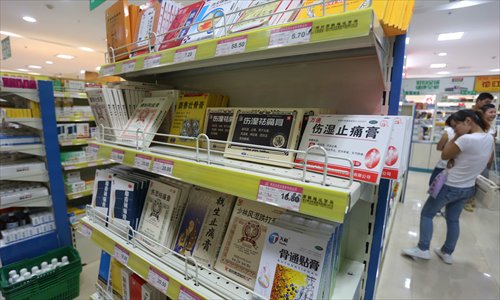
A woman looks at medicine in a drugstore in Xuchang, Central China's Henan Province. China's quality watchdog recently tightened vigilance against illegal drugs sold online by unqualified distributors, which threaten the health of consumers, People's Daily reported Tuesday. China's online drug sales reached 1.6 billion yuan ($261 million) in 2012, four times the sales revenues in 2011. (Photo: IC)
People often say "an aspirin a day, keeps the heart attack away." What if the aspirin you buy is fake?
Chinese authorities recently busted a gang accused of selling more than 10 million yuan ($1.49 million) of counterfeited drugs, including the commonly used pain-killer, to 21 provinces and municipalities including Beijing and Tianjin.
The seized counterfeit aspirin was identified to contain no active ingredients with zero medical effect, and law enforcement officers believed that they were made of starch, thepaper.cn reported on Thursday.
So far police have arrested 26 people involved nationwide, and 29 former employees from drug stores selling the fake medicine are prohibited from engaging in drug manufacturing and sales for 10 years.
In Spring 2018, a 77-year-old resident in Chuzhou, East China's Anhui Province, who is a cerebral infarction patient for over a decade, reported to authority that the aspirin tablets he bought from a local pharmacy tasted a bit sweet and were dissolved in water immediately. After taking the drug for a month, the resident suffered from unsteady balance and an unclear head, said the report.
The Chuzhu Food and Drug Administration's investigation found that the aspirin had a fake manufacturer's name, address, registered trademark and drug approval numbers.
The administration and police then seized the representative of the pharmacy in May 2018. This representative helped police locate a man surnamed Hu who allegedly bought materials and tools online to make fake medicine.
Police found packing boxes, pills and tools for the manufacture of fake medicine at Hu's home in Harbin, Northeast China's Heilongjiang Province. They also seized more than 2,000 boxes of fake medicine for high blood pressure at the scene.
Dou Renxiang, a law enforcement officer with the administration, said that the gang has a large sales network, and Hu promoted his fake drugs through social media WeChat and QQ instant messenger, and sold them to provinces and cities including Beijing and Tianjin, the news site under the State Administration for Market and Regulation reported.
Tian Guangqiang, an assistant research fellow at the National Institute Global Strategy at the Chinese Academy of Social Sciences, who also specializes in public health, told the Global Times that those involved in manufacturing and selling fake medicine should be severely punished, and that employees of pharmacies and doctors should be banned from entering in the industry for life. This is because counterfeited drugs could result in the aggravation of symptoms and even lead to death.
Tian said that China should learn from the US to greatly increase fines to manufacturers that support fake drug businesses.
In recent years, more fake drugs have been sold online.
Police in East China's Zhejiang Province reported a case concerning fake medicine on April 1. It involved the sale of fake drugs used for cosmetology online,and police detained 42 suspects. The case involved 100 million yuan in total, legaldaily.com.cn reported.
Online sales platforms should strictly review the identity and qualifications of drug store owners, and social media platforms must improve their reporting system for fake drugs, and immediately ban those allegedly selling fake drugs, according to Tian.


